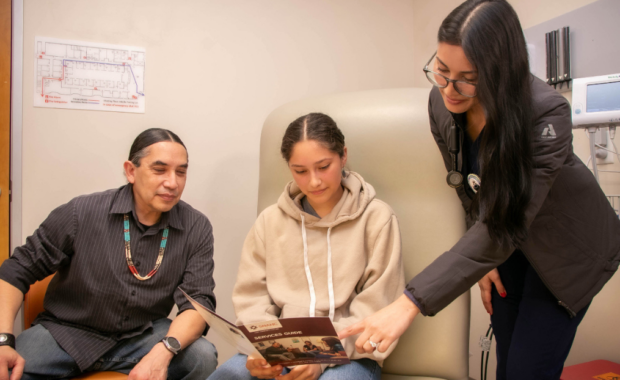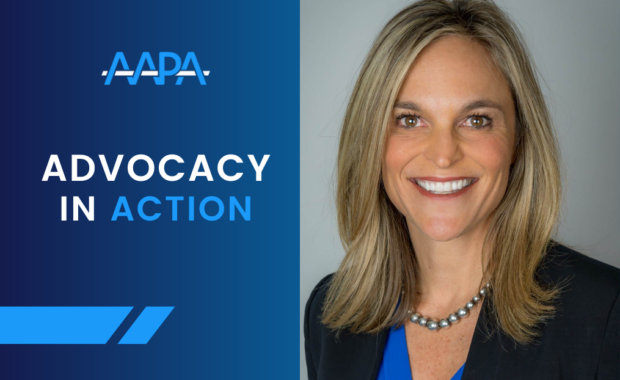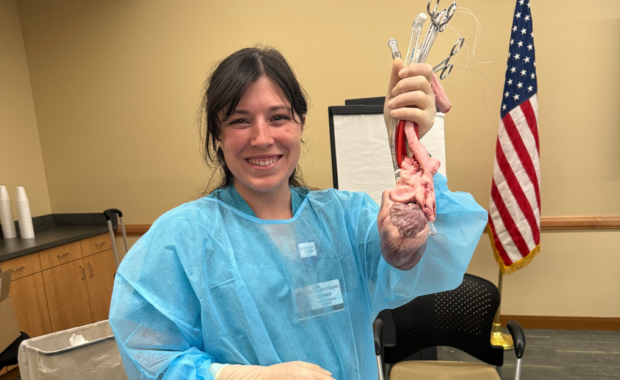PA Experts Respond to Pressing Nutrition Questions
PAs Take Opportunity to Ask Advice of Nutrition Experts in Huddle “Ask Me” Session Online
March 18, 2019
By Divya Williams
AAPA invited two PA experts to host a Huddle “Ask Me” session on nutrition. In “Ask Me” sessions, AAPA members can ask experts questions and receive personal answers. This session focused on the PA role and challenges faced with nutrition-related issues.
Ellen Mandel, PA-C, DMH, MPA, MS, RDN, CDE, and Corri Wolf, PA-C, MS, RDN, both have interest and expertise in nutrition. Mandel has been a PA for 22 years and a registered dietitian nutritionist for nearly 40 years and has a strong foundation in nutrition as prevention and treatment of acute and chronic conditions. Mandel is currently a Clinical Professor for Pace University, Physician Assistant Studies-Lenox Hill Hospital – NYC. Wolf is an Associate Professor, Academic Coordinator, and Assistant Chair in the Department of PA Studies at New York Institute of Technology. Before becoming a PA, she worked as a Registered Dietitian in a variety of areas and has worked clinically as a PA for an outpatient gastroenterology practice for the past 12 years.
Below, Mandel and Wolf respond to a variety of questions relating to nutrition and patient care; several addressed the difficulty of simply broaching the subject.
Starting the nutrition conversation
Wolf acknowledges that the hardest part about talking nutrition with patients is often getting the conversation started. Nutrition can be a touchy subject when speaking with patients about weight. “I don’t ask about their ‘diet’ because some may feel I am implying they are on a diet when I am really just asking what they eat,” Wolf shares. She begins with questions like “can we discuss your weight?” in order to give patients an option and feel more in control. “I usually use the Body Mass Index (BMI) chart. … That way it is based on objective findings, although I am aware of the flaws in relying on BMI.” Mandel also refers to a colorful BMI chart that she keeps by the scale and often tries to get the patient to draw their own conclusion that their weight is problematic by connecting to concerns for the family or for recurring medical problems. She emphasizes that “it is important to be as non-judgmental as possible, and stress that you are interested in helping them, not to chastise them.”
Nutrition advice for low-income patients
Offering nutrition advice to low-income patients with limited access to healthy options can require more personalized instruction. “Eating well on a budget can be tricky but there are a lot of resources out there to share with your patients so you are not recreating the wheel,” Wolf says. She suggests whole grains with longer shelf lives and frozen items in bulk. For example, buying frozen vegetables in large quantities, or buying fresh produce when it’s in-season, is less expensive.
Some patients with poor nutrition may come in for a different health concern but are working two to three jobs and are short for time. In these cases, Wolf recommends doing “a quick dietary history/recall asking what they ate over the past 24 hours. Then you can make a few suggestions about how they can modify their choices keeping in mind cultural food preferences.” She also suggests keeping some handouts in multiple languages on hand to assist with any language barriers. Considering a patient’s situation beyond the walls of the exam room is paramount when offering guidance.
Tips for being a healthier PA and setting an example
Mandel points out that, in addition to patients, PAs’ friends and family often also seek out their advice. She reminds us that dieting is not a long-term solution, but that “halting weight gain through increased activity first, and then adding-in small, yet important eating pattern changes,” is what will help patients achieve lifelong health. When referring healthy eating tips to PAs themselves, Mandel says “it is not uncommon for PAs to have a vested interest in a topic based on personal need. This makes you an excellent mentor/coach for your patients from the get-go.”
For those trying to set a good example for their children, Wolf offers her opinion that fostering positive body image is critical at certain ages. She advises parents to highlight making healthy food choices instead of emphasizing weight. As an example, she recommends cooking or preparing meals together – “you could make a menu for the week, create a food list, shop for the food together all the while you are teaching her or him about healthy choices, reading labels, and cooking on the sly.”
Nutrition in PA education
Mandel emphasizes that PAs in all areas must recognize that nutrition has a profound impact on patient outcomes. Her personal commitment to include more discussion about nutrition in patient care encounters led her to become a PA educator. She was surprised by how little PA students knew about nutrition and found that both medical schools and PA programs invested limited time and resources to the topic.
“I believe that PA programs can do a better job at times, of carving out nutrition, coaching, activity in courses such as evidence-based medicine (EBM) or prevention. If we don’t address PA education gaps now, the next PA generation will be hard pressed to both prevent and manage major public health morbidity,” Mandel says.
She likens clinicians to coaches and says even though coaching is often viewed as a “soft science,” EBM supports its value. She offers a claim that “PAs need to view consistently poor diets as similar to tobacco use. They both take years to kill, but the odds are in their favor. Yes, PA curricula is packed, however, programs need to strategize about old/new/essential/redundant material.”
From intermittent fasting to fad diets, there’s a constant influx of information regarding nutrition that PAs are responsible for sifting through and deciphering in order to make the best possible recommendations to their patients. But when help is needed, consulting an expert is always a reliable option.
Keep an eye out for the next “Ask Me” session on AAPA’s Huddle and consider taking part in these relevant and personalized conversations.
Read the full Ask Me session online.
Additional Resources
AAPA’s Obesity Leadership Edge Curriculum
Hit the Reset Button Part 1: Healthy Eating in 2019
Hit the Reset Button Part 2: Healthy Eating in 2019
Hit the Reset Button Part 3: Healthy Eating in 2019
Ask Me – Lifestyle Medicine with Brad Biskup, PA-C
Divya Williams is a communications associate at AAPA. Contact her at [email protected].
Thank you for reading AAPA’s News Central
You have 2 articles left this month. Create a free account to read more stories, or become a member for more access to exclusive benefits! Already have an account? Log in.




